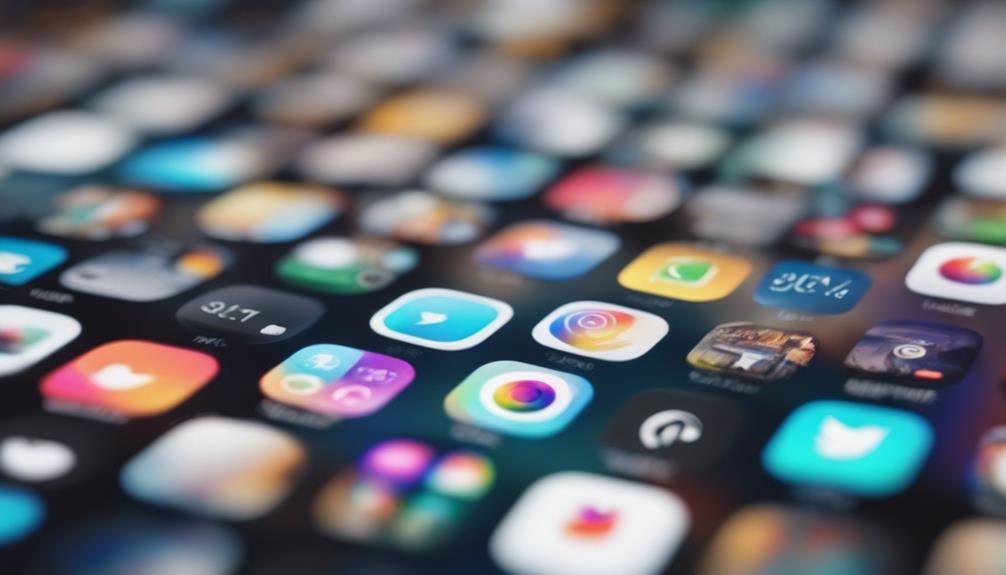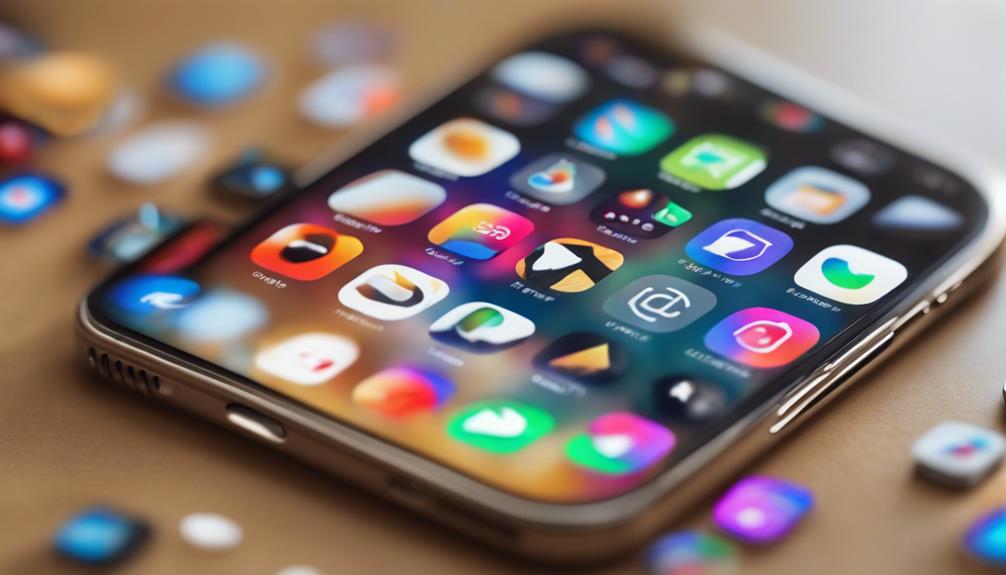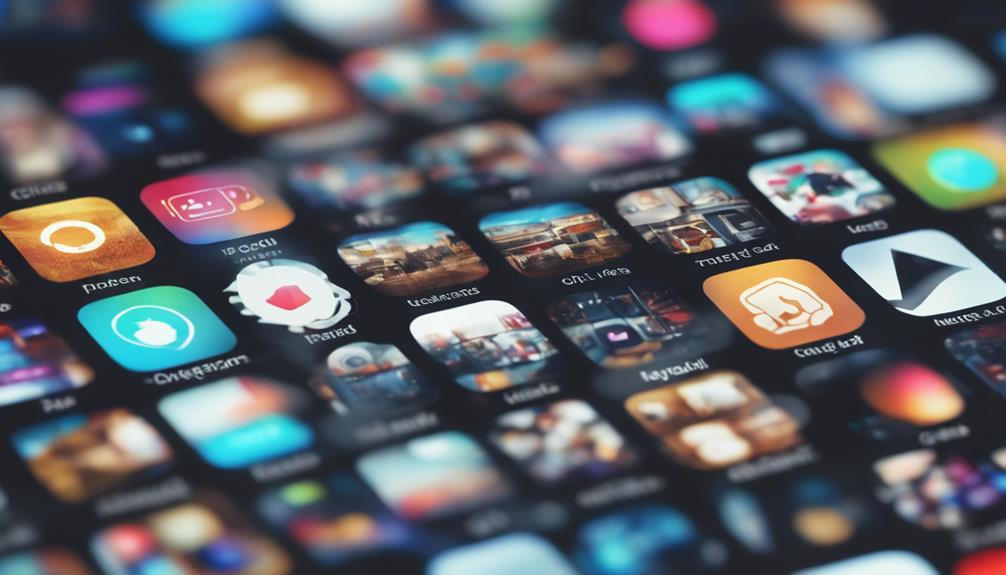The Apple App Store is indeed in the process of removing outdated apps, aligning with a proactive clean-up initiative. This move aims to enhance quality, security, and user experience by focusing on eliminating obsolete applications. While the removal may impact up to 750,000 live apps, it ultimately improves app discoverability, security, and user satisfaction. Developers face the task of updating apps within a 30-day window to meet Apple's standards, emphasizing the company's dedication to maintaining a curated and secure App Store ecosystem. Further insights into this initiative can shed light on Apple's continuous efforts to guarantee app relevance and user satisfaction.
Key Takeaways
- Apple is systematically removing outdated apps to enhance security and user experience.
- Developers have 30 days to update their apps to meet Apple's standards.
- Removal of obsolete apps aims to improve app discoverability and efficiency.
- Outdated apps impact platform efficiency and user satisfaction.
- Apple's clean-up initiative focuses on app relevance, quality, and security.
Apple's App Store Clean-Up Initiative
The Apple App Store is actively implementing a clean-up initiative to remove outdated apps. This initiative requires developers to update their apps within a 30-day window; otherwise, the apps face removal from the store. The primary goal of this effort is to enhance the overall quality, security, and user experience of the App Store by removing obsolete applications. While apps that have been previously downloaded by users will remain on their devices even if they're removed from the store, the focus is on ensuring that the available apps are up-to-date and relevant.
Since 2016, Apple has had this policy in place, although the enforcement of app removals may vary. By removing outdated apps, Apple aims to streamline the App Store, making it easier for users to find high-quality and current applications. This proactive approach benefits both developers and users, ensuring that the platform remains a trusted source for reliable and up-to-date apps.
Impact of Removing Outdated Apps

Removing outdated apps from the Apple App Store has a significant impact on the platform's overall efficiency and user satisfaction. With up to 750,000 live apps out of 2 million being affected by the removal policy, developers are pushed to update their apps promptly to avoid being removed.
This initiative not only enhances app discoverability but also guarantees improved security and user experience across the platform. However, some developers face challenges in updating older apps, sparking concerns about the fairness of the policy.
Despite this, Apple's strict stance aligns with industry standards, aiming to drive app evolution, enhance security measures, and foster user trust. By enforcing timely updates and removing outdated apps, Apple is committed to maintaining a relevant and secure App Store environment, ultimately benefiting both developers and users alike.
Apple's Efforts for App Relevance

Apple's ongoing efforts aim to ensure app relevance by enforcing timely updates and maintaining a secure App Store environment. Developers are required to submit updates within 30 days to avoid the removal of apps that haven't been updated in the last three years. This aligns with Apple's goals of enhancing discoverability, security, and user experience.
The App Store's policy, in effect since 2016, aims to improve security, privacy, and overall user experience by removing outdated apps. Apple's criteria for removal include the absence of updates and low download rates, similar to Google's efforts to bolster user security.
However, these measures may pose challenges for indie developers and game creators, particularly in updating older games, raising concerns about keeping pace with the rapid changes in mobile game development.
Enhancing User Experience With Updates

Regularly updating features in apps not only enhances performance but also guarantees users have access to the latest functionalities. Continuous improvement through updates can address bugs, enhance user experience, and even introduce new features that cater to evolving user needs.
Updating Features Regularly
Developers enhance user experience by updating app features regularly to guarantee functionality and compatibility with newer iOS versions. This practice not only improves the user experience but also ensures that apps work seamlessly on the latest operating systems, providing users with up-to-date features and peak performance. By keeping their apps current, developers demonstrate their commitment to quality and user satisfaction, aligning with Apple's encouragement for regular updates to maintain relevance in the App Store.
The removal of outdated apps from the App Store underscores the importance of developers staying proactive in updating their features. Outdated apps cluttering the platform can hinder user experience and may not function correctly on newer devices or operating systems. Therefore, by focusing on improvement and innovation, developers can ensure that their apps meet Apple's standards and provide users with a consistently excellent experience.
This emphasis on updating features regularly not only benefits users by enhancing their interaction with apps but also drives developers to prioritize quality over quick profits, fostering a culture of continuous improvement in app development.
Improving Performance Continuously
Enhancing user experience through continuous performance improvements is essential in app development to guarantee functionality and compatibility. Apple's recent move to remove outdated apps from the App Store underscores the importance of app updates in maintaining user satisfaction. By requiring developers to update outdated apps within 30 days, Apple aims to enhance user experience and security while improving app discoverability. This initiative involves removing a significant number of outdated apps to make sure that users have access to high-quality and up-to-date applications.
Continuous updates not only benefit users by providing them with improved functionality but also help developers stay abreast of the latest mobile game development changes. By aligning with industry standards for app evolution and security, Apple's enforcement of app updates sets a precedent for the industry. Ultimately, the focus on improving performance continuously through app updates is essential for ensuring that apps remain compatible with newer devices and iOS versions, thereby enhancing the overall user experience.
The Importance of App Maintenance

App maintenance plays a crucial role in upholding Apple's standards for app quality and user experience in the App Store. Regular maintenance is essential for developers to comply with Apple's policy on outdated apps. To prevent removal from the store, developers must update their apps within 30 days. Outdated apps cluttering the store not only impact user experience but also hinder app discoverability.
Apple's Quality Control Measures

Apple's stringent quality control measures in the App Store are designed to uphold standards of app currency and user satisfaction. Apple enforces a policy to remove apps not updated in the last three years, impacting up to 750,000 live apps out of 2 million. Developers are granted a 30-day window to submit updates to avoid app removal, with the goal of enhancing discoverability, security, and user experience.
Launched in 2016, the removal policy focuses on improving security, privacy, and user experience by eliminating outdated apps. Apple's criteria for app removal include the absence of updates and low download rates, aligning with Google's policies to enhance user security and reduce technical debt. However, this policy has raised concerns among game developers who argue that games should be considered complete artworks that don't necessitate continuous updates akin to movies.
Ensuring App Functionality and Relevance

To guarantee app functionality and relevance, Apple evaluates app performance, adherence to review guidelines, and ongoing user value. When apps are deemed outdated, developers receive a warning email and are granted a 30-day window to update their apps to meet current standards. Failure to do so may result in the app being removed from the App Store.
It's crucial to mention that while removed from the store, previously downloaded apps will still remain on users' devices. This policy, in effect since 2016, aims to clear out apps that are no longer functional or relevant, ultimately enhancing the overall user experience within the App Store.
Enforcement practices of this policy may vary, but the core objective remains to make sure that users have access to apps that are up-to-date, functional, and valuable. By regularly evaluating and removing outdated apps, Apple maintains a high standard of quality and relevance in its App Store offerings.
Significance of App Updates for Users

Regular app updates play an important role in enhancing security, privacy, and overall user experience. By ensuring compatibility with newer devices and the latest iOS versions, app updates help maintain functionality and performance.
Users benefit from these updates through bug fixes, new features, and improved performance, making them essential for a seamless mobile experience.
Importance of Security Updates
Ensuring that apps are regularly updated with security patches is essential for safeguarding user data and privacy. Regular app updates play an important role in protecting against potential vulnerabilities that hackers could exploit, leading to data breaches and privacy violations.
Outdated apps that lack security updates pose significant risks, leaving users vulnerable to malware infections and unauthorized access to their sensitive information. Apple's proactive stance on app updates underscores their commitment to enhancing security, privacy, and the overall user experience.
Users must prioritize updating their apps to stay ahead of evolving cybersecurity threats and ensure their digital safety.
- Security updates are essential for protecting user data and privacy.
- Regular app updates patch vulnerabilities to prevent hacking and data breaches.
- Outdated apps without security updates expose users to risks like malware and unauthorized access.
Enhancements for Better Performance
App updates play an important role in enhancing the performance and user experience of apps. Regular updates are essential for addressing issues such as bugs, compatibility issues, and security vulnerabilities that may arise in outdated apps.
By implementing improvements through app updates, developers can guarantee that users have access to new features, optimizations, and overall enhancements that contribute to a more reliable and enjoyable experience. In addition, these updates are necessary for maintaining security standards and compatibility with the latest devices and operating system versions.
Users benefit from the efforts of developers who work diligently to provide updates that not only fix existing issues but also introduce enhancements that elevate the overall performance of the app. As such, staying up to date with app updates is key to maximizing the potential of the app and ensuring a smooth and secure user experience.
Apple's Focus on App Store Cleanup

Amid ongoing efforts to enhance user experience and maintain a curated platform, Apple diligently focuses on cleaning up the App Store by removing outdated apps. This initiative is vital for ensuring the App Store remains a reliable and secure environment for users and developers alike.
Key aspects of Apple's focus on App Store cleanup include:
- Developers' Responsibility: Developers are given a 30-day window to update apps that haven't been refreshed in a significant amount of time. This proactive approach encourages developers to maintain the relevance and functionality of their apps.
- Evaluation Criteria: Apple assesses apps based on functionality, adherence to review guidelines, and relevance to users. Apps that don't meet these criteria may be flagged for removal to uphold quality standards.
- Enhancing User Experience: By removing outdated apps, Apple aims to improve security, privacy, and overall user experience. This cleanup effort contributes to a curated App Store ecosystem where users can trust the quality of available apps.
Improving App Efficiency and Quality

Apple's emphasis on enhancing app efficiency and quality is exemplified through the systematic removal of outdated apps from the App Store. By implementing a policy that targets apps not updated within a significant timeframe, Apple aims to guarantee that users have access to high-quality and up-to-date applications.
Developers are given a 30-day window to update their apps to meet Apple's standards and avoid removal from the store. This approach not only streamlines the App Store but also contributes to a more effective user experience. Apple's verification process, which reviews even minor updates, underscores the importance of app maintenance in the ever-evolving digital landscape.
Encouraging developers to focus on app quality and innovation, this initiative promotes a healthier app ecosystem for users. Ultimately, the removal of outdated apps serves to elevate the overall standard of apps available on the App Store, emphasizing the significance of app efficiency and quality in meeting user needs.
Maintaining App Store Relevance

Apple emphasizes the importance of app updates to maintain App Store relevance. They encourage developers to engage users through regular improvements. By adhering to Apple's guidelines and prioritizing user satisfaction, developers can enhance their app's visibility and ranking within the store's algorithm.
Ensuring apps are up-to-date not only benefits developers but also enhances the overall user experience. It promotes quality and functional applications.
App Updates Importance
Regular app updates are vital for maintaining the relevance of apps in the App Store ecosystem. Developers must adhere to Apple's policy of updating their apps within 30 days to meet quality standards and guarantee a positive user experience.
By regularly updating their apps, developers contribute to the platform's security, privacy, and overall user satisfaction. Apple's focus on functionality, review guidelines, and relevance underscores its commitment to providing users with up-to-date and secure applications.
The removal of outdated apps, part of a long-term strategy implemented since 2016, aims to enhance security measures, protect user privacy, and elevate the overall user experience on the platform.
User Engagement Strategies
User engagement strategies in the App Store focus on promoting updated apps that align with current iOS versions and guidelines. By regularly removing outdated apps, Apple aims to enhance discoverability and improve the user experience. This approach encourages developers to stay active, update their apps, and meet evolving user expectations.
The removal of old apps not only clears the clutter but also highlights newer, more relevant ones, helping users discover high-quality, up-to-date apps for a better overall experience. These user engagement strategies are essential for maintaining the relevance of the App Store, ensuring that users can easily find apps that are compatible with their devices and offer the latest features.
Through these efforts, Apple not only enhances the user experience but also incentivizes developers to keep their apps up-to-date and in line with current standards, ultimately benefiting both users and app creators.
Algorithmic App Ranking
Utilizing an intricate algorithmic system, the App Store maintains its relevance by assessing various factors such as download numbers, user ratings, and app usage. This algorithmic approach guarantees that the most popular and high-quality apps receive the visibility they deserve, enhancing user experience and app discoverability.
- Apps with higher rankings are more likely to be featured and recommended to users, increasing their exposure and potential downloads.
- Algorithmic ranking helps users discover popular and high-quality apps, leading to a more engaging and satisfying app browsing experience.
- Developers can optimize their apps to improve visibility and ranking within the algorithm, encouraging them to focus on creating valuable and innovative apps that meet user needs and preferences.
Apple's Approach to Outdated Apps

Apple systematically evaluates and removes outdated apps from the App Store based on functionality, review guidelines, and relevance. This approach guarantees that the apps available to users meet quality standards and provide a positive user experience.
Developers are given a 30-day window to update apps that haven't been maintained for a significant period. Failure to update within this timeframe may result in the removal of the app from the App Store. Apple's evaluation process considers the functionality of the app, adherence to review guidelines, and the relevance of the app to current market trends.
While the enforcement of this policy may vary, the overarching goal is to maintain a curated selection of apps that are up to date and beneficial to users. By regularly updating and removing outdated apps, Apple aims to uphold the integrity and quality of the App Store, ensuring that users have access to the latest and most relevant applications.
User Benefits of Removing Obsolete Apps

Benefiting both users and developers, the removal of obsolete apps from the Apple App Store enhances overall user experience and promotes a healthier app ecosystem. By clearing out outdated apps, users can reap the following benefits:
- Improving App Discoverability: With obsolete apps out of the way, users can easily find relevant and up-to-date apps that meet their needs.
- Enhancing User Trust: A streamlined App Store conveys a sense of reliability and quality, fostering trust among users in the platform.
- Maintaining Quality and Security: Users benefit from a more secure environment as the removal of outdated apps ensures they've access to functional, updated, and safe applications.
The focus on quality apps that are regularly updated not only enhances the user experience but also encourages developers to innovate and improve their apps, leading to increased user satisfaction. Removing obsolete apps is a step towards creating a more user-friendly and trustworthy environment within the App Store.
Apple's Commitment to App Quality

Maintaining a high standard of app quality is a key priority for the Apple App Store. Apple's dedication to app quality is evident through its enforcement of policies that aim to enhance the overall user experience. One such policy involves the removal of outdated apps that have not been updated within a significant timeframe. Developers are given a 30-day window to update their apps before facing potential removal from the store. This process not only motivates developers to keep their apps up to date but also guarantees that users have access to new and updated content regularly.
To further elevate app quality, Apple evaluates apps based on various criteria such as functionality, review guidelines, and relevance. These evaluations help uphold a high standard of quality across the platform. The App Store improvements in this area have been ongoing since 2016, showcasing Apple's continuous efforts to provide users with the best possible experience when using apps from the store.
| Criteria | Description |
|---|---|
| Functionality | Ensuring apps work as intended and provide value to users. |
| Review Guidelines | Compliance with Apple's guidelines to maintain a safe and secure environment. |
| Relevance | Keeping apps up to date and relevant to users' needs and interests. |
App Store Cleanup for Better User Experience

Taking a proactive approach to app maintenance, the App Store initiates a cleanup process to enhance the user experience. Apple is warning developers to update apps not updated in a significant amount of time to enhance user experience. Developers have a 30-day window to update their apps before they risk being removed from the App Store.
The focus of Apple's policy is on clearing out outdated apps to improve the overall quality and relevance of the platform. Apple evaluates apps based on functionality, review guidelines, and relevance to determine which apps need updates. This app cleanup initiative has been in effect since 2016, with enforcement varying over time.
Frequently Asked Questions
Does Apple Remove Old Apps?
Apple does remove old apps from its App Store to maintain quality and security. Since 2016, Apple enforces a policy that requires developers to update their apps at least every three years. Failure to do so can lead to app removal.
This approach helps improve user experience, security, and app discoverability. Developers have 30 days to submit updates to avoid removal, with a 90-day grace period and an appeal process available.
Why Does the App Store Remove Apps?
The App Store removes apps to enhance discoverability, security, and user experience. This policy, effective since 2016, aims to boost app quality.
Developers must update apps not revised in three years within 30 days to prevent removal. Around 750,000 live apps out of 2 million might be impacted.
Criteria for removal include lack of updates, low downloads, and guideline adherence. It's part of Apple's efforts to maintain a high standard in the App Store.
How Do I Find Out What Apps Are Outdated on My Iphone?
To identify outdated apps on an iPhone, users should follow these steps:
- Navigate to the App Store.
- Tap on their profile picture.
- Select 'Purchased' to view downloaded apps.
- Look for apps with an 'Update' button, indicating they require updating.
- Check the 'Last Updated' date for each app to determine when it was last updated.
Apps not refreshed in recent years may be outdated and subject to removal from the App Store.
How Do I Delete Old Apps From the App Store?
To delete old apps from the App Store, developers need to update them within 30 days to prevent removal. Apple's policy targets apps not updated in the last three years for potential deletion.
If facing removal, developers can appeal and have 90 days to comply with the update requirement. This policy aims to enhance app discoverability, security, and user experience.
Approximately 750,000 live apps out of 2 million could be affected by Apple's policy on outdated apps.
Conclusion
To sum up, Apple's proactive approach to removing outdated apps from the App Store is essential for maintaining relevance and improving user experience.
While some may argue that older apps should still be available, the reality is that outdated apps can pose security risks and hinder overall functionality.
By prioritizing app quality and relevance, Apple is ensuring that users have access to a curated selection of apps that meet current standards and provide a better overall experience.










